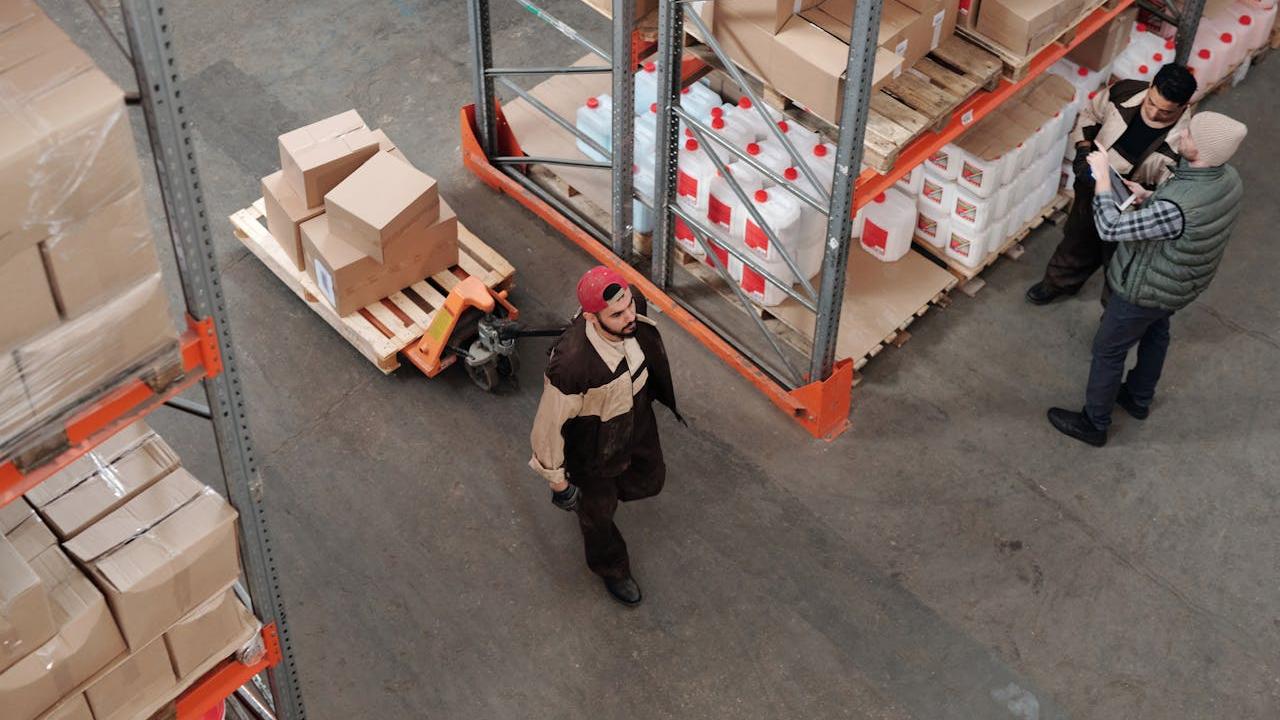Consideration Stage – How Odoo Transformed a Manufacturing SME: A Ruetech Case Study (English)
Subtitle: Evaluating ERP options through real-world success – a German manufacturing SME’s journey with Ruetech and Odoo

After recognizing the need for digital transformation, the next step for any SME is the evaluation of possible solutions. In the consideration stage, German business decision-makers are likely comparing different approaches: Should we go for a comprehensive ERP like Odoo, or stick with our legacy systems and plug in smaller tools? What would an implementation look like in practice? To shed light on these questions, let’s explore a real-world case study of how Ruetech GmbH helped a manufacturing SME in Germany overhaul its operations with Odoo. This story will provide insights into the challenges faced, the solution implemented, and the results achieved – helping you understand what to expect when considering an ERP project.
Background: The SME and Its Initial Challenges
Our case in point is Müller Maschinenbau GmbH (name changed for privacy), a mid-sized manufacturing company in Germany’s Baden-Württemberg region. Müller Maschinenbau has around 100 employees and produces specialized mechanical components for the automotive and aerospace industries. Before approaching Ruetech, the company was grappling with a host of issues common to many manufacturing SMEs:
- Our case in point is Müller Maschinenbau GmbH (name changed for privacy), a mid-sized manufacturing company in Germany’s Baden-Württemberg region. Müller Maschinenbau has around 100 employees and produces specialized mechanical components for the automotive and aerospace industries. Before approaching Ruetech, the company was grappling with a host of issues common to many manufacturing SMEs:
- Disparate Systems: The company used one software for inventory management, another for accounting (DATEV), and a collection of Excel sheets for production scheduling and CRM. These systems were not integrated, leading to frequent data inconsistencies. For example, the sales team might promise a delivery date not realizing the production schedule was already full – classic left-hand/right-hand miscommunication.
- Limited Visibility: Management lacked real-time visibility into operations. If a client asked for an order status, someone would have to run to the shop floor or check with multiple departments. Generating a simple monthly performance report could take days.
- Growth Pains: Over the years, Müller Maschinenbau had grown in revenue and complexity. They planned to launch an online portal for clients to track orders and wanted to implement better quality control tracking. However, their patchwork systems made any new initiative cumbersome. The IT manager (one of the few tech specialists in the firm) said they were at a breaking point – the status quo could not support the company’s growth plans.
These pain points echo what many German manufacturing SMEs face: operational inefficiencies, lack of integration, and difficulty scaling. The company’s leadership realized that continuing this way would hurt their competitiveness. They entered the consideration stage looking for an ERP solution that could unify their operations. After researching options – including SAP Business One and Microsoft Dynamics – they were drawn to Odoo for its flexibility and cost-effectiveness. They reached out to Ruetech GmbH for guidance on how Odoo might address their needs.
The Ruetech Approach: Analysis and Solution Design
Ruetech began with a comprehensive pre-project analysis (a service we provide to all prospective clients). Our team spent time onsite (and via remote workshops) to map out Müller’s processes in detail – from order intake and production scheduling to procurement and shipping. This step is crucial: a thorough needs analysis ensures that any ERP implementation is tailored to the client’s unique workflows. Through these discussions, several key requirements for the new system emerged:
- The solution needed integrated modules for Sales, Inventory, MRP (Manufacturing Resource Planning), Purchase, and Accounting, so that data flows seamlessly from one department to another.
- It had to support real-time production tracking (to know exactly what’s happening on the shop floor).
- The ERP must handle German financial regulations (like proper invoicing, tax calculation, GoBD-compliant record keeping).
- A user-friendly interface was important to get buy-in from staff, some of whom were not tech-savvy.
- Future scalability for an e-commerce customer portal and advanced quality management was a plus.
Ruetech recommended an Odoo implementation as the optimal solution, given these requirements. Odoo’s modular nature meant we could start with core apps and later expand. We proposed the following solution components:
- Sales & CRM: To manage customer orders, quotations, and communications in one place.
- Inventory & Purchasing: To automate stock level updates, link with Bills of Materials (since Müller Maschinenbau assembled products from many components), and streamline reordering of parts.
- Manufacturing (MRP): To create production orders directly from sales orders, schedule work orders for each machine, and track work center capacity. Odoo’s work center control panel (using tablets on the shop floor) was introduced for real-time updates from production staff.
- Accounting: Fully integrated with sales and purchases – when an order ships, an invoice is generated in Odoo’s accounting module, ensuring finance sees every transaction. We also integrated a DATEV export to satisfy the finance team’s needs for year-end accounting in a familiar format.
- Custom Module for Quality Control: Ruetech’s developers built a small custom Odoo module to record quality inspections at various production stages, since compliance and traceability are critical in Müller’s industry (especially with ISO standards they adhere to).
Throughout the consideration phase, we kept an open line of communication. Case studies and demos were crucial. We demonstrated similar projects (anonymized) where manufacturing clients of Ruetech achieved impressive results, such as a 30% reduction in lead time from order to delivery. We even arranged a reference call with one of our past clients in the manufacturing sector so Müller’s team could ask candid questions about Odoo. This transparency helped build confidence that Odoo was the right fit.
Implementation Highlights and Overcoming Hurdles

Once Müller Maschinenbau decided to proceed with Odoo and Ruetech, the project kicked off in earnest. Even at the consideration stage, it’s useful for SMEs to know what an implementation entails, so they can weigh the effort vs. reward. Here are highlights and lessons from this case:
- Phased Implementation: We decided on a phased rollout. Phase 1 covered Sales, Inventory, Purchasing, and basic Accounting – essentially to get the core order-to-invoice process live. Phase 2 would introduce the MRP module and Quality Control custom features. This approach meant the company started seeing benefits within 3 months, and more advanced features came shortly after.
- Data Migration: One major consideration was how to migrate data from legacy systems. Müller had 5 years of sales data in an old system and thousands of inventory records in Excel. Ruetech scripted data import routines into Odoo, cleansing and consolidating information. We carefully planned a cut-over weekend where opening balances, stock levels, and outstanding orders were imported. SMEs should consider the state of their existing data – cleaning up customer/vendor lists beforehand, for example, can smoothen this step.
- User Training and Change Management: A new system can be intimidating. Ruetech provided bilingual training sessions (German primarily, with English technical terms when needed) for different user groups – warehouse staff, sales team, management. By involving end-users early and addressing their concerns, adoption was much easier. In fact, some staff who initially resisted the change became enthusiastic when they saw how much time they saved on tasks like creating delivery notes.
- Localization: We configured Odoo to use German language for interfaces and reports, ensured that documents like invoices had the required legal wording, and installed the GoBD compliance module for audit-proof data handlingodoo-bs.com. This gave the finance department peace of mind that the new system met German regulatory standards. odoo-bs.com. Dies gab besonders der Finanzabteilung das Vertrauen, dass das neue System den deutschen Anforderungen gerecht wird.
- Challenges: Not everything was smooth sailing. In Phase 2, when we activated the manufacturing module, we encountered an issue with scheduling logic due to a very custom production process Müller had. This required a customization in Odoo’s planning algorithm. Thanks to Odoo’s open-source flexibility and Ruetech’s development expertise, we adjusted the system to handle Müller’s bespoke workflow. The key takeaway for consideration: no ERP works 100% out-of-the-box for every unique business need, but Odoo’s flexibility allows for tailored solutions – an area where Ruetech’s experience is vital.
Results: Tangible Improvements Post-Odoo

Within 6 months of the initial go-live, Müller Maschinenbau’s operations transformed significantly. These results can help any SME in the consideration phase see the potential ROI of an Odoo implementation:
- Integrated Data, Better Decisions: The management dashboard now gave a live view of key metrics – open orders, production backlog, inventory valuations, and financials – all in one place. Decisions became data-driven. What used to require weekly meetings and spreadsheets now was available at a glance, improving responsiveness.
- Efficiency Gains: By eliminating manual processes, the company saved hundreds of working hours. Order processing that once involved duplicate entry in multiple systems became a single, streamlined flow. For example, generating a production order from a sales order is now a one-click action. The error rate in orders dropped, as there was less manual rekeying of data.
- portcities.netOn-Time Delivery and Customer Satisfaction: Perhaps the most impactful metric – Müller Maschinenbau improved its on-time delivery rate dramatically. Before Odoo, they met promised delivery dates roughly 70% of the time. After implementation, that metric climbed to ~90%. A study of another manufacturer using Odoo reported a 50% improvement in meeting customer shipping requirementsportcities.net, and Müller’s experience was similar. This boost in reliability led to happier customers and even new business, as their reputation for timely delivery spread.
- Inventory Optimization: With better inventory tracking and automated reordering rules, stockouts were virtually eliminated. The purchasing team could see what was needed in advance thanks to Odoo’s reordering rules and triggers. Meanwhile, inventory carrying costs went down because they identified over-stocked items and reduced excess stock by 15% after analysis.
- Empowered Employees: Surprisingly, one of the softer outcomes was improved morale. Employees in production and sales felt less frustration because they had the tools to do their job efficiently. The shop floor workers liked the tablet interface for work orders (no more crumpled paper job tickets), and the sales team appreciated being able to check stock and order status instantly while on calls with customers. The whole company felt more “in control” of their operations.
From these results, it’s clear that the consideration stage for Müller Maschinenbau moved from “Is this the right choice?” to a resounding “Yes, and it’s paying off.”
Key Takeaways for SMEs in Consideration Phase

What can other German SMEs learn from this case when considering an ERP, especially Odoo with Ruetech as a partner?
- Do a Thorough Needs Analysis: Don’t rush into buying software without understanding your processes. Work with experts (like Ruetech) who take time to learn your business. This ensures the solution you consider is aligned with your real needs.
- Leverage Demonstrations and References: Seeing is believing. Ask for demos tailored to your use cases. Talk to existing Odoo users if possible. Ruetech often facilitates reference conversations because we believe an informed customer makes the best decisions.
- Consider Flexibility and Total Cost: In comparing ERP options, Müller looked at SAP and others. Odoo stood out for flexibility (open-source core, many available modules) and cost-effectiveness. There were no hefty license fees for adding a module, and development/customization could be done incrementally. This modular approach can be ideal for SMEs who need to watch budgets and adapt over time.
- Think Long-Term Partnership: The case study also highlights the value of a good partner. Ruetech didn’t just drop software and leave; we collaborated closely throughout and continue to provide support. When evaluating solutions, consider the partner’s track record and support offerings. A local partner who understands German business culture and language can smooth the journey considerably.
- Prepare for Change: Any ERP introduction will change how your team works. During consideration, plan for training and change management. Get buy-in by involving key team members early. In our story, early skepticism turned into advocacy once the team realized the benefits. That turnaround is more likely if you address concerns head-on and ensure the solution is user-friendly (Odoo’s modern interface helped here).
In conclusion, the consideration stage is about gathering evidence and confidence. By examining real success stories like the one above, German SMEs can visualize how their own transformation might play out. Müller Maschinenbau’s journey with Ruetech and Odoo demonstrates that the challenges of today can be overcome with the right technology and partner, leading to substantial operational gains. As you consider your options, weigh the practical outcomes – improved efficiency, better data, happier customers – against the status quo. If the goal is to modernize and grow, a proven solution like Odoo in the hands of an experienced implementer can be the catalyst to get you there.